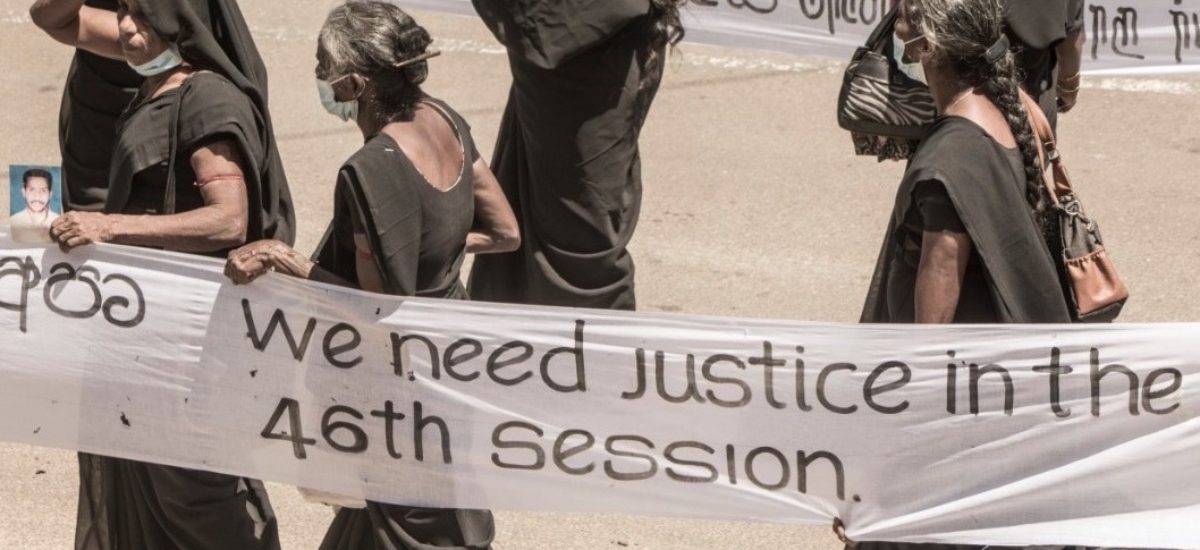Photo courtesy of Kumanan Kanapathippillai
The United Nations Human Rights Council (HRC) passed a resolution on promoting reconciliation, accountability and human rights in Sri Lanka despite government opposition. This will allow ongoing monitoring of a situation that has grown worse over the past year, especially for minorities and dissidents, as well as putting the spotlight on past abuses and the needs of the bereaved and survivors.
A Core Group made up of Canada, Germany, Montenegro, Malawi, Northern Macedonia and the UK drew up the resolution. Twenty two countries voted in favour, with 11 against, including China, Russia and Pakistan, and 14 abstentions including India. This followed intensive lobbying both by the Sri Lankan government, which had hoped for a majority against, and some diaspora groups which had wanted stronger wording. Earlier attempts to persuade President Gotabaya Rajapaksa’s regime to cooperate in developing an approach which would offer citizens greater protection against rights violations had failed.
Those for and against greater state accountability had sought India’s support. In a statement before the vote, the Indian delegation expressed its support for both the unity, stability and territorial integrity of Sri Lanka and for addressing Tamil concerns and guaranteeing fundamental freedoms and rights for all.
Against a background of worsening repression, ongoing monitoring
In a brutal civil war that ended in 2009, both state forces and the Tigers had committed multiple abuses. A highly critical report in January 2021 (updated in February) by the UN High Commissioner for Human Rights, Michelle Bachelet, pointed out that “Nearly 12 years since the end of the war, domestic initiatives for accountability and reconciliation have repeatedly failed to produce results, more deeply entrenching impunity and exacerbating victims’ distrust of the system. Sri Lanka remains in a state of denial about the past, with truth-seeking efforts aborted.” What is more, over the past year there had been “clear early warning signs of a deteriorating human rights situation and a significantly heightened risk of future violations.” She called for “strong preventive action.”
In the weeks that followed, although the cruel ban on burials for Muslim COVID-19 victims was finally lifted, in an obvious bid to win over potential critics in the international community, other aspects of the human rights situation have got worse. The dramatic expansion of prevention of terrorism legislation to allow up to two years detention on the vague grounds of causing “religious, racial, or communal disharmony” was a further sign of an increasingly dictatorial approach.
Against that background, the resolution underlined the need for human rights and democracy, including state accountability for its past and present actions. Fulfilment of commitments to devolution, equality and justice was emphasised. The High Commissioner was asked to keep monitoring the situation and report to the next few sessions of the HRC.
If matters become even worse, it is possible that more drastic measures will be called for, although protection by some of the Sri Lankan government’s overseas allies may shield it from some consequences of mistreating the people who it is meant to protect and serve.
The passing of the resolution is a major diplomatic defeat and puts the spotlight on the regime in a way that will be uncomfortable. The vote may encourage the government at least to slow the pace of the downward slide from basic norms of human rights. However, a key issue is whether the ruling elite can persuade a majority of Sinhalese Buddhists that it really cares about their interests, especially amid the social and economic problems made worse by the pandemic.
Against this background, a key challenge for those defending human rights in Sri Lanka and their allies across the world will be to take a consistent approach to human rights for all, pointing out that violations leave all but the most powerful vulnerable. This means taking on the board the varied economic and social as well as political and cultural rights that have been eroded recently or are under threat; breaking down barriers that divide and highlighting the human cost to those still waiting to find out what happened to loved ones, or feeling insecure, is important. Rights are not just about principles but about people.
The HRC’s decision opens up possibilities. The challenge is to find ways to defend the democratic space which remains and seek to build wide commitment to a more compassionate and just Sri Lanka.


